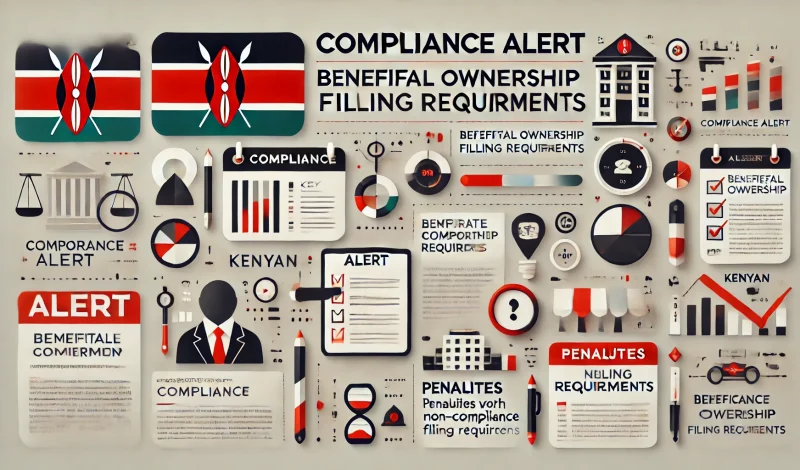Introduction
The Registrar of Companies recently issued a critical directive that requires all companies and Limited Liability Partnerships (LLPs) in Kenya to comply with the requirement on filing of beneficial ownership information, as outlined in Section 93A of the Companies Act and Section 31B of the Limited Liability Partnership Act. This mandate, enforced through the Business Registration Service (BRS), emphasizes the importance of transparency and accountability in Kenya’s corporate landscape. Understanding the new obligations, penalties for non-compliance, and required timelines is essential for all business owners and stakeholders who wish to remain compliant with Kenyan law.
The directive mandates that private limited companies must submit their beneficial ownership information to the Registrar of Companies by 30th November 2024, while LLPs will receive a compliance deadline at a later date.
The Objective
This is part of a broader initiative to combat financial crimes such as money laundering, terrorism financing, and other illicit activities. By mandating disclosure of beneficial ownership details, the BRS aims to ensure that the individuals who ultimately exercise control over companies or LLPs are known to authorities, creating an environment for easy detection of financial crimes. Transparency in ownership aligns with Kenya’s obligations to international standards, such as those set by the Financial Action Task Force (FATF), to prevent financial malpractices and bolster corporate governance.
Beneficial ownership information includes details about individuals who directly or indirectly own or control a company or LLP, such as significant shareholders and persons with substantial influence in decision-making. This means that companies and LLPs must maintain a detailed record—known as the beneficial ownership register—of all individuals with significant control or influence over the business. This register is to be filed with the Registrar of Companies, as required by law and updated regularly to allow regulatory authorities to monitor the ownership structures of entities operating within Kenya.
Penalties for non-compliance
Non-compliance with this directive carries substantial penalties. Companies and LLPs that fail to file beneficial ownership information for five consecutive years may be struck off the register of active businesses effectively revoking their status as legally operational entities. For those who fail to maintain a beneficial ownership register or file updates within 14 days of any changes, additional financial penalties apply. The law imposes an initial penalty of Ksh. 500,000, and subsequent daily fines of up to Ksh. 50,000 until compliance is achieved. Failure to update beneficial ownership information within the mandated 14 days of any change results in an administrative fine of Ksh. 2,000, with an additional Ksh. 100 per day for continued default. These strict penalties underscore the government’s determination to enforce compliance and maintain a transparent corporate environment.
To meet these requirements, companies and LLPs should first identify individuals who hold significant ownership or control within their organization. This includes shareholders holding over a 25% ownership stake or individuals with substantial decision-making power. Once identified, the entity should prepare a beneficial ownership register, documenting each individual’s full name, ID number, residential address, ownership percentage, and the date they assumed control. After creating this register, it must subsequently be filed with the Registrar of Companies within the stipulated timelines. To keep a brace with compliance in case of changes, companies and LLPs should also establish internal processes such as hiring a Firm of Advocates who will not only undertake statutory compliance within specific timelines but also closely monitor ownership changes. This proactive approach will help avoid unnecessary penalties and ensure compliance with both local and international standards.
Conclusion
In an increasingly globalized economy, transparency in ownership is viewed as a positive attribute that attracts investors and builds trust among clients, partners, and regulatory bodies. Moreover, compliance with these regulations will protect businesses from the risks associated with being involved in financial crimes or illicit transactions, which under the Proceeds of Crime and Anti Money Laundering Act (POCAMLA), can have far-reaching consequences for both the entity and its stakeholders.
By understanding and fulfilling the requirements on disclosure of information, companies and LLPs will not only protect themselves from the risk of legal penalties but also reinforce their commitment to good governance practices. This compliance move, positions Kenya as a reputable hub for business, aligned with international efforts to create an accountable and crime-free corporate sector. We encourage all affected businesses to take immediate steps to meet these requirements, helping to contribute to a transparent, secure, and prosperous economic landscape in Kenya.

By:
Samwel Chumba
Legal Intern
8th November 2024

Michael Okumu
Senior Partner
8th November 2024







